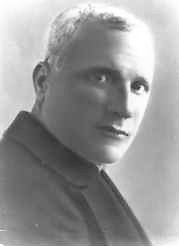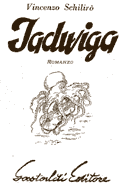Writer, philosopher, art
critic, profound connoisseur of Italian literature, poet and
sociologist Vincenzo Schilirò His
writings range from Italian literature to philosophy, from criticism
to poetry, from sociology to aesthetics and dramaturgy

The Brontese Vincenzo Schilirò, (7.1.1883 - Catania 3.7.1950)
priest, professor, was a singular figure of sociologist, critic,
scholar and poet ("educator and scholar" defines him Nicola Lupo in
his meticulous historical research, published in this site).
He was born in Bronte on 7 January 1883 from Carmelo and Anna Maria
Minio. He studied at the Real Collegio Capizzi obtaining the
gymnasium license in 1898 with the highest marks; he continued his
studies at the Catania Seminary, where on 22 December 1906 he was
consecrated as a priest by Archbishop Giuseppe Francica-Nava.
He graduated in the Royal University of Catania in 1912, at
twenty-nine, presenting as thesis "The Carduccian belief" that was a
revelation and an amazement.
Antos, one of his biographers, writes in his "Vincenzo Schilirò
- Profilo" (1931) that «the prof. Paolo Savj-Lopez, rapporteur of it
and incontestable critic, declared that never before had a debutant
had seen to present a thesis so perfect in the form and in the
substance.»
But as the Schilirò not attending the courses of the faculty was
little or nothing known by the professors of the University and also
for the originality of the subject and personal style, perhaps for
the cassock that he wore, the doubt arose among the professors that
work was not the result of one's sack. Some of them, moved by
sectarianism then in fashion, even advanced the suspicion that the
work was a maneuver of intrusive clericalism that aimed to reclaim
the belief of Carducci atheist. The Commission slipped a few months
to obtain the title by requesting a new essay written to Schilirò.
It was in this way that in October of the same year he presented, as
well as the Carduccian belief and its value, a second work which,
despite its diversity, complements the previous study, that is,
Romanticism and pedantic friends, the discussion of which was a
success and lively satisfaction for Savj-Lopez, who repeatedly
invited the Schilirò to make contact with the Florentine literary
cenacle of which he was an influential member.
After obtaining a doctorate in Literature, Schilirò accepts for
campanilismo the teaching in the Lyceum of The Real
Capizzi College, bringing you oxygen and new ideas. He taught Italian
letters for a decade and in the sleepy Bronte was appreciated for
the volcanic social and educational initiatives.
He continues his studies, works, publishes texts without seeking
glory, fame or wealth, satisfied mainly for having expressed what
was fantastic and positive was contained in his multifaceted mind.
It satisfies its love for science by externalizing it and extending
it to the less able, sees in this the social and educational purpose
of Culture.
In addition to being a teacher and playwright, he also distinguished
himself as a social and financial worker, a journalist and also as a
politician. Founded, in various
times, four newspapers, an Agricultural Bank, a cultural
circle and a typography, (the glorious Social
Typography, publisher of a great deal of books, of mostly
local authors). He adhered to the Popular Party and the new
tendencies, in the social field, expressed by the modernism and not seen
favorably by Pope Pius X, reason for which he moved away from the church, without however
stopping to wear the cassock. The art, poetry, aesthetic
criticism were the field where he could better express his lively intelligence. But his first experiences were of publicist with the humorous sheet "U
Trabanti" (a jumble of dog Latin and vernacular), with the
periodic "Protagonist" (who after the sentence inflicted by Pius X°
in
1907 ceased to exist), the fortnightly "Domani" (Tomorrow) (of
political administrative character, turned to give a contribution to the
organization of the brontese farmers), with "Nuova Juventus"
(destined
to the pupils of the Capizzi) and at last, the direction (together with Pietro
Mignosi) of the literary magazine "The tradition".
 Withdrawn
from teaching for health reasons, he moves to Catania and in his
habitation of Via Morosoli continues the literary production. Withdrawn
from teaching for health reasons, he moves to Catania and in his
habitation of Via Morosoli continues the literary production. Died at 67 years following a cerebral
hemorrhage.
He is buried in the family chapel of the Bronte's cemetery. Among his works we remember
Aesthetics notes
(1924, Bronte), The Romanticism and "the
pedantic friends" (1912, Bronte), The
aesthetic reasons of the dannunziana art (1918, Catania), Carducci's belief and his value (1918, Bronte), F.
T. Marinetti and the futurism (1919, Catania), How
I see Pirandello, Freedom and democracy (Seli,
Rome). There are also numerous novels (the last of 1946, entitled
Iadwiga (Gastaldi, Milano 1946) written during the fascist
period, however, the press was not authorized by the Ministry of
Popular Culture; several theatrical works (some published) that he
wrote to delight young people in high school and fellow citizens,
one of these: «Il matto jester», was played by the great forgotten
Biancavillese composer Carmelo Sangiorgio, also a professor in the
Bronte College. Published works in verses: Sad spring (1912, Bronte), Santo Francesco (1931,
Bronte), lyric short stories (Who sows but does not reap); two dramas: The culprit
(1919 Bronte), Il Carroccio (The wagon, 1931 Bronte) and a comment to Divine Comedy of Dante in three volumes, by now
unobtainable.
|